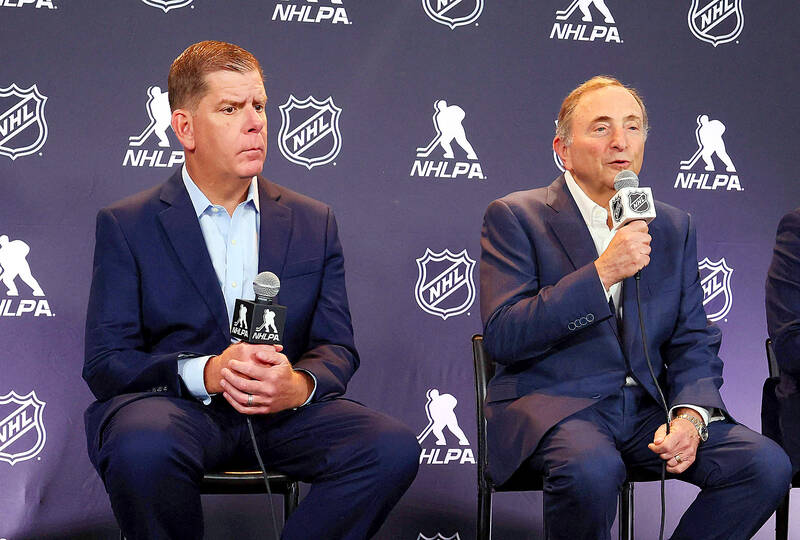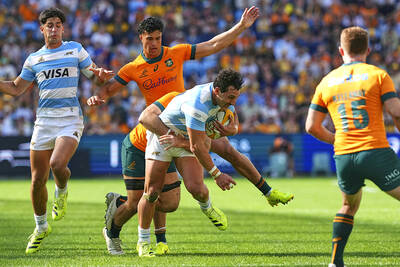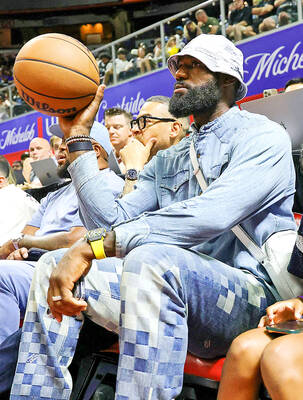An 84-game season is coming to the NHL as part of an extension of the collective bargaining agreement that has been tentatively agreed to by the league and the NHL Players’ Association (NHLPA).
They announced a memorandum of understanding on Friday in Los Angeles before the first round of the draft. It still needs to be ratified by the Board of Governors and the full NHLPA membership.
Two games are being added to the regular season, the maximum length of contracts players can sign is being shortened and a salary cap would be implemented in the playoffs for the first time, two people told The Associated Press on Thursday.

Photo: Getty Images via AFP
The NHL and NHLPA began negotiations in earnest this spring after agreeing at the 4 Nations Face-Off in February to jointly hold a World Cup of Hockey in 2028. With revenue breaking records annually and the cap increasing exponentially in the coming years, NHL commissioner Gary Bettman and union executive director Marty Walsh voiced optimism about reaching an agreement quickly. There were no disagreements on a host of major issues like in previous bargaining talks.
“There’s been tremendous growth, and what’s ahead is spectacular on many fronts,” said Toronto’s John Tavares, who is going into his 17th season. “The predictability of things goes a long way, I think, for everyone in the sport. It’s great to have that partnership and how collaborative it’s been, which has been very different from 2012. It’s great to see and happy that the growth of the game and the sport and the business side of it is all kind of in sync and in synergy and we’re able to kind of continue to build off the many great things over the last few years.”
The extension through 2030 provides the sport extended labor peace since the last lockout in 2012-2013, which shortened that season to 48 games.
Going from 82 to 84 games beginning next year — making the season 1,344 total games — is also expected to include a reduction in exhibition play to four games apiece for the 32 teams.
The additions would be played within divisions, evening out the schedule to ensure four showdowns each season between rivals like Toronto and Boston, Dallas and Colorado, and Washington and Pittsburgh. Currently, there is a rotation that has some division opponents facing off only three times a season.
That imbalance is coming to an end, and this is not the first time the NHL has had an 84-game season. The league experimented with that in 1992-1993 and 1993-1994, when each team added a pair of neutral site games.
Since 2013, players have been able to re-sign with their own team for up to eight years and sign with another for up to seven years. Under the new agreement, each would be reduced by a year, to seven for re-signing and six for changing teams.
Top players, given the injury risks in the sport, have preferred the longest contracts possible. The same goes for general managers, eager to keep talent in the fold as long as possible. “I guess that could be a rarity now,” said Trent Frederic, who on Friday signed an eight-year contract to remain with the Oilers. “Eight years is better than seven. It’s good to lock in before that changes.”
However, with the salary cap getting its biggest increases season by season over the next three years, the thinking had already begun to change. Auston Matthews re-signed for only four years with Toronto last summer, and Connor McDavid could also opt for a short-term contract extension with Edmonton.
Currently, teams with players on long-term injured reserve can exceed the salary cap by roughly the amount of the players’ salaries until the playoffs begin.
Several times over the past decade, Stanley Cup contenders have used the reserve to activate players at the start of or early in the playoffs after they missed some or all of the regular season.
Florida did so with Matthew Tkachuk before winning the second of back-to-back titles, Vegas has done it with Mark Stone on multiple occasions, Tampa Bay with Nikita Kucherov and Chicago with Patrick Kane.
The rule has been criticized as an unfair loophole, a way to stockpile talent and then add even more for the post-season.
That would no longer be possible, though it is not exactly clear how it would work.

‘DEVASTATED’: Argentina’s win was a reversal of their 28-24 defeat last week, with Australian forward Fraser McReight adding that ‘we did the same thing last week’ Argentina flyhalf Santiago Carreras punished an undisciplined Australia with 23 points off the tee as the Pumas held on grimly for a 28-26 win in Sydney yesterday to breathe new life into their Rugby Championship campaign. A try-fest beckoned in afternoon sunshine at Sydney Football Stadium, but Argentina needed only one through captain Julian Montoya, with Carreras doing the damage with seven penalties and a conversion in front of a sell-out crowd. A week after letting a 14-point lead slip in a 28-24 defeat to Australia in Townsville, Argentina saw most of a 21-point advantage erased in the final quarter as the

ELEVEN STRIKEOUTS: Blake Snell allowed two singles and two walks against the Rockies as he ended a personal three-game skid with his first win since Aug. 16 Blake Snell on Wednesday struck out a season-high 11 in six innings, while Mookie Betts hit a grand slam in the eighth as the Los Angeles Dodgers defeated the Colorado Rockies 9-0 for their fourth straight win. Helped by their third series sweep of the Rockies this MLB season, the Dodgers increased their National League West lead to three games over the San Diego Padres, who lost 2-1 at home to the Cincinnati Reds. Betts went four for five with five RBIs, capped by his seventh career slam on a 3-0 pitch from reliever Anthony Molina to make it 8-0. Andy Pages and

Captain Vijay Kumar led the way yesterday as the Hsinchu Titans claimed the Taiwan Premier League title at the Yingfeng Cricket Ground in Taipei’s Songshan District (松山), beating PCCT by 27 runs. The weather was a topic again, but not the rain that played a role in previous matches in the often-delayed tournament. Kumar, who made 80 not out from 63 deliveries, and teammate Vishwajit Kumar (58 from 43) rescued the Titans from a precarious state at the end of the power play in the T20 match. The visitors were put in to bat and struggled to 26-3 as PCCT

China’s state-run People’s Daily newspaper on Monday published an essay about Chinese basketball it said was written by LeBron James, but a representative for the NBA star said on Thursday that the article was based on a series of interviews. The paper, better known as the mouthpiece of the Chinese Communist Party, had said James authored the essay, “Basketball is a Bridge that Connects Us,” a tribute to Chinese players and fans of the sport written in the first person. “LeBron James Pens an Article in the People’s Daily,” read a post published on the newspaper’s official WeChat account. On Thursday, a representative